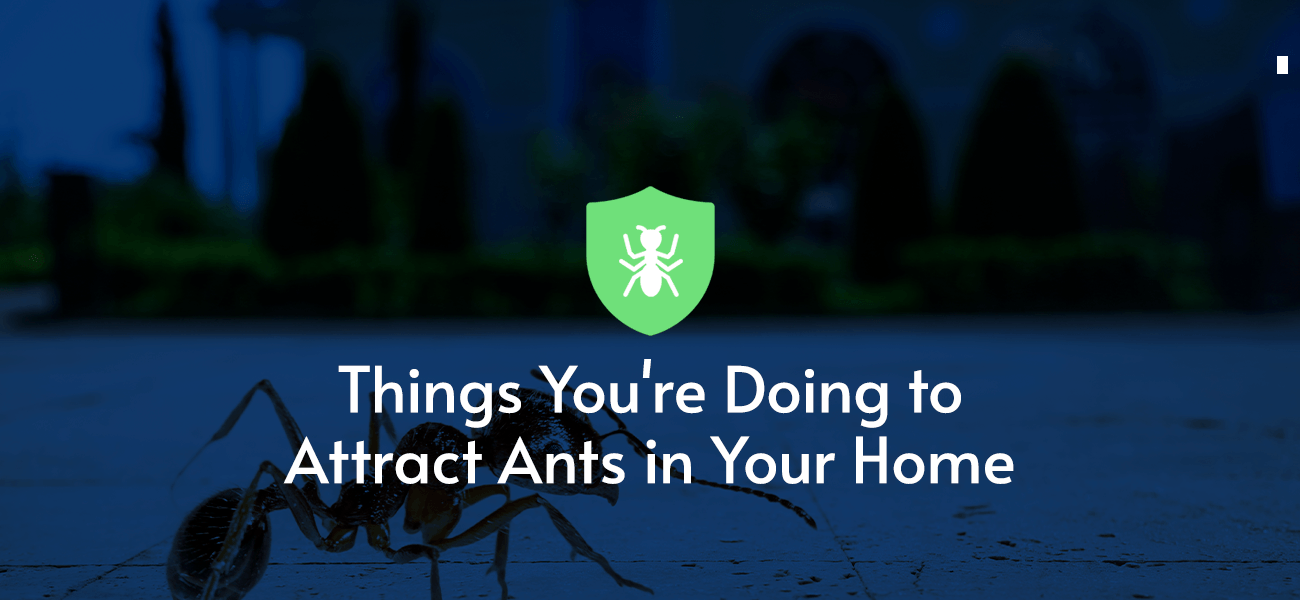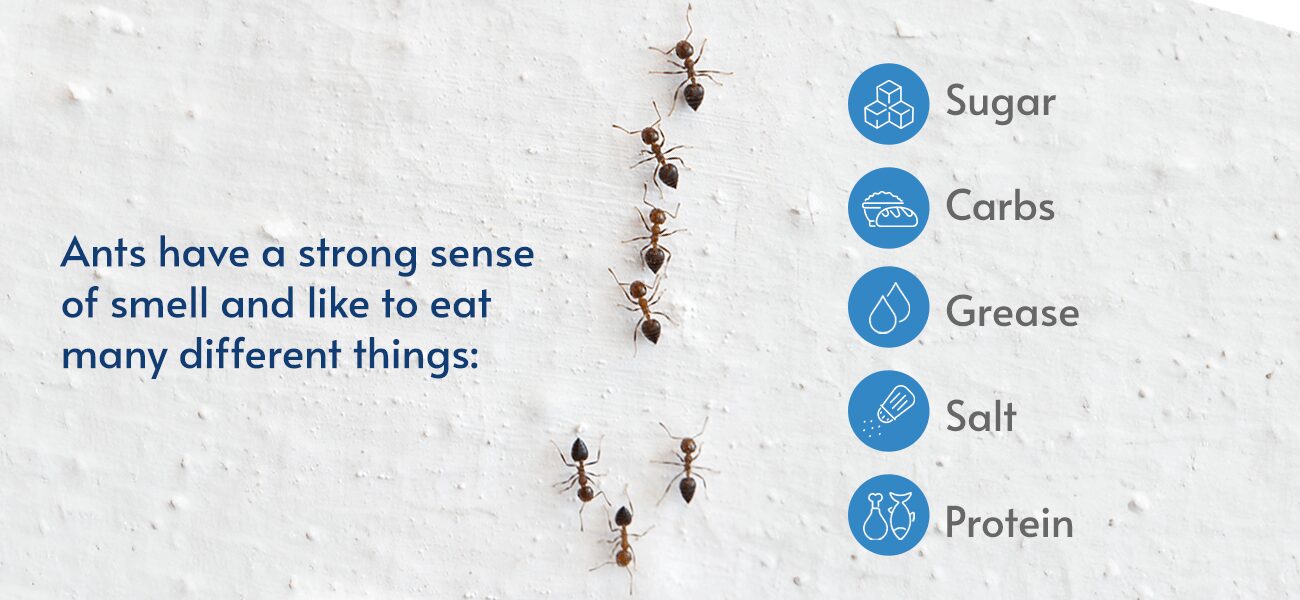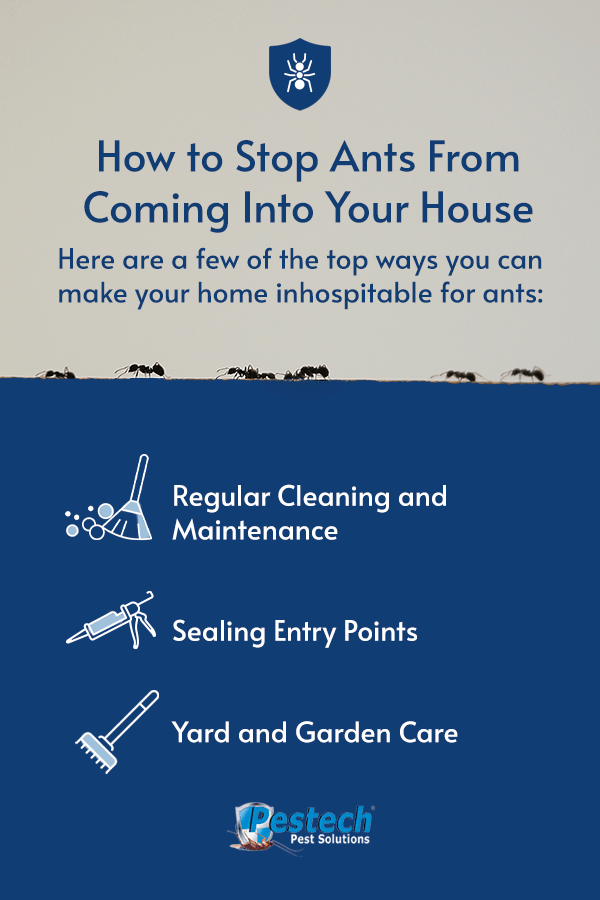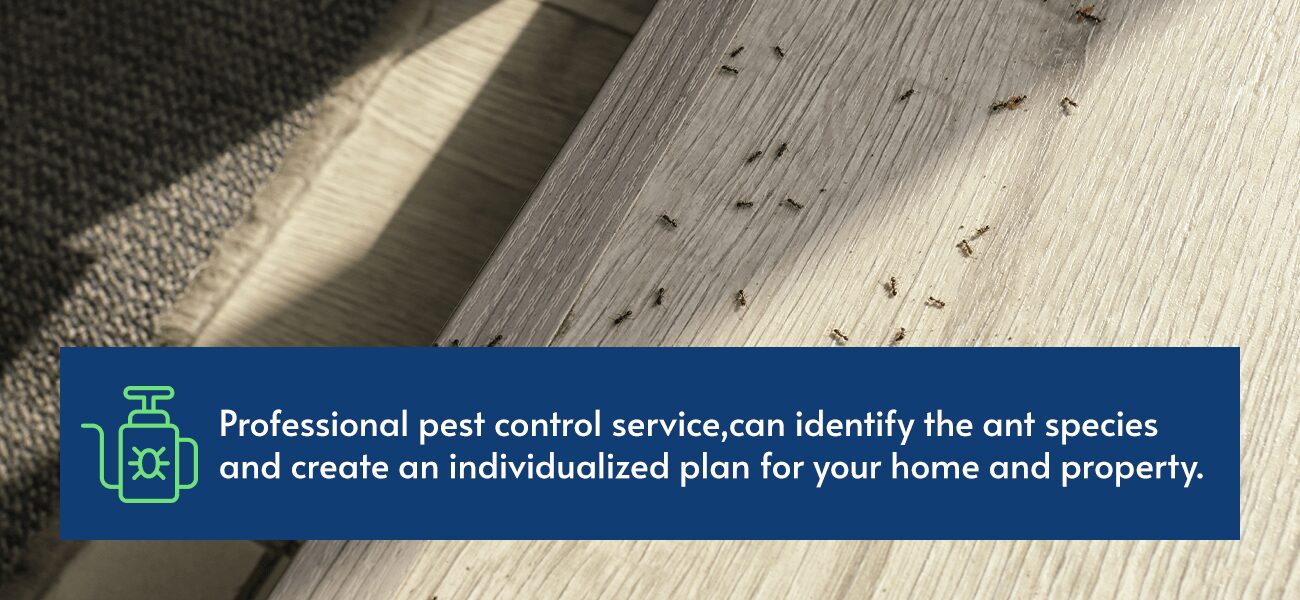Things You’re Doing to Attract Ants in Your Home

If you’re having a problem with ants invading your home, don’t panic. There are several practical steps you can take right away to help with the problem. Like other pests, ants come inside in search of three things — food, water or shelter.
To kick ants out of your house, you can make food and water inaccessible. Ants are hard-working foragers, and they’ll look elsewhere if they can’t meet their needs inside your house.
In some cases, sealing up food and water might not be enough — especially if the ants in your home eat wood and live inside the walls. If you try these steps and the ant invasion doesn’t go away, a professional pest control service is your next line of defense.
What Attracts Ants in My Home?
In the wild, ants find food, water and shelter in various ways. However, it’s often easier to access these resources inside a structure like your home. When ants move indoors, they also escape the perils of nature, like weather and predators.
Food Sources
Food is the number one thing attracting ants to your home. If you leave dirty dishes in the sink, have crumbs on the floor or leave food containers accessible, ants may show up to investigate and carry the crumbs away.

Ants have a strong sense of smell and like to eat many different things:
- Sugar
- Carbs
- Grease
- Salt
- Protein
Because they’re attracted to sweet smells, they may also enter your house in pursuit of laundry detergent, candles and other scented products. While they can’t eat these items, they may find another food source while inside.
Water Sources
Water is another basic need for ants. If your home has leaky pipes, drippy faucets or another accessible water source, it will be much easier for ants to camp out and live inside the house. Their need for water is one reason ants tend to invade kitchens and bathrooms.
Assessing water accessibility in your home can help you keep ants out. Keep an eye on pet water bowls, use a dehumidifier for spaces like the bathroom and fix any leaky pipes. If ants can’t access any water in your home, they won’t stay there.
Shelter
Ants like dark, warm environments. Depending on the type of ant, they may build a nest inside your home, underneath it or nearby for easy access to food and water. Understanding the kind of ants you have can help you know where they might be staying.
When ants find food, they leave a pheromone trail that allows other ants to find the food source. That’s why you’ll see ants parading in a straight line toward an unknown destination. If you trace back the line, you may be able to find where ants are entering your home and block it off.
How Do Ants Get Into Your Home?
Ants can enter your home through small cracks and crevices along windows, doors and walls. They may also come inside through your basement via cracks in the foundation. Thankfully, there are practical steps you can take to prevent ants from gaining access.
Cracks and Crevices
Seal any cracks and crevices that would allow ants to come inside. This can also improve your energy bill by keeping your air conditioning and heating system from leaking into your home’s surrounding environment.
Examine windows, doors and other exterior openings. It’s also a good idea to check your foundation and the exterior walls of your home for any cracks or damage. Repair everything that looks suspicious, and remember that ants can enter through very small openings.
Outdoor Attractants
Ants may be attracted to flowering bushes in the landscaping outside of your home. You may have noticed that ants like swarming over sweet flowers like peonies and roses. If these are planted close to your house, ants may explore the exterior and find a way inside.
The same thing is true for overgrown vegetation. If you have vines or plants growing up the side of your house or around your doors, they may provide a road into your home. By clearing off the sides of your house, you can make it harder for ants to get close enough to venture inside.
Outdoor Food Sources
Ants at a picnic are an expected nuisance — they always show up because of their superb sense of smell. If you like to eat outdoors or regularly leave pet food outside, they may be attracted to your house because they’re looking for the source of that delicious smell.
Cleaning up your food, sweeping away crumbs and only putting out pet food when your dog or cat is hungry can help keep ants away. Some people surround their pet food with water, but that won’t stop the ants from smelling it and coming to investigate.
Specific Ant Species and Their Behaviors
There are many species of ants, and each one behaves differently — for example, the characteristics of ant trails and nests can vary. Knowing which species you’re dealing with is the first step to getting rid of them. Here’s a quick overview of the most common household ants you’ll find in the New York area:
Carpenter Ants
These ants chew up wood and use it to build nests. Because of this behavior, ant damage to your home can cause structural issues. Carpenter ants are large compared to many other species, and they’re attracted to wet or moldy wood because it’s easier for them to chew.
Odorous Ants
As their name suggests, these ants smell strange when you crush them. They are comfortable nesting in many different places indoors and tend to forage 24/7 — so you won’t only see them at night. Odorous ants tend to move inside during rainy seasons.
Pavement Ants
These ants are named for their living habits — they tend to build nests under pavement, coming in and out through cracks. Because many homeowners have patios and paved driveways, pavement ants can enter your home through proximity.
Little Black Ants
Homeowners often see little black ants in their kitchens foraging for food. Although they prefer to live outside, these ants do sometimes move into wood or masonry in a home. They are much smaller than other types of ants, hence their name.
Pharaoh Ants
Pharaoh ants are difficult to treat because they build small nests in multiple locations. Originally from Africa, these ants thrive in warm places and chew on many different things. They’re often found in large buildings but can also invade private residences.
Acrobat Ants
When these ants are worried about a possible threat, they lift their abdomens up — hence their interesting name! Acrobat ants prefer a lot of water, so they look for moist environments like damp wood or water leaks. This species often comes inside by traveling across foliage into a building.
How to Stop Ants From Coming Into Your House
If you have a lot of ants crawling around your home or just a few, it’s wise to make some changes to your housekeeping. A small number of ants can quickly grow if there’s food readily available for them. Here are a few of the top ways you can make your home inhospitable for ants:

Regular Cleaning and Maintenance
Quickly assess the inside of your house. How often do you sweep the kitchen floor? Does dirty laundry tend to sit out in a hamper for a while before it gets washed? Ants can be attracted to the salt on worn clothes, crumbs in your kitchen or standing water in your bathroom.
Try these steps to limit the ants’ food supply:
- Wipe down your table and kitchen counters after every meal.
- Sweep the floor or vacuum after every meal.
- Store your food in airtight, sealed containers.
- Put pet food away except during meal times.
- Fix any leaking or dripping pipes.
- Wash laundry frequently so it doesn’t sit out.
- Eliminate sweet-smelling candles and detergents.
By removing what attracts ants to your home, you may convince them to look elsewhere. Of course, ants that are living inside your walls may decide to eat outside without moving out. If you still see a lot of ants inside, call a professional pest control company.
Sealing Entry Points
Another step for keeping ants out of your home is to seal any possible entry points. Examine your home’s exterior for any cracks, crevices or damage that could let insects inside. Use door jambs, caulking and other fixes to seal any cracks.
Pay attention to where ants are going inside your home. If they disappear into a light socket, a crack in the floor or around a window, target that area. Try safely sealing that exit while also removing any potential food source.
Yard and Garden Care
To keep ants from being interested in your house, trim landscaping and keep sweet-smelling plants away from your home. You should never stack chopped wood against your house, since it can attract termites in addition to ants.
Clean up dead leaves and use a weed trimmer to keep grass short. Pull away vines and creepers that start to grow up the walls, and trim any tree branches that start to brush against the building. Ants will often climb along plants to reach your home.
Prevention and Treatment of Ant Problems
The most effective way to treat ants depends on the species you’re dealing with. When you call in a professional pest control service, they can identify the ant species and create an individualized plan for your home and property.

Here are a few ways that professionals treat ants:
- Liquid or dust insecticides
- Granular bait or bait stations
- Fumigation in extreme cases
Professionals are knowledgeable about attractants and repellants for ants. They can give you tips on how to seal up entry points, store food properly and trim your landscaping. Often, a combination of these treatments and steps is the most effective way to get ants out of your house for good.
Natural Treatments for Ants
Several natural ingredients can help to destroy or deter ants. However, they take longer than professional treatments and may not be as effective. Here are a few examples of how to use natural ant solutions:
- Sprinkle diatomaceous earth to kill them.
- Mix borax with sugar and water to poison them.
- Repel ants with essential oils like peppermint and citronella.
Using these methods may help with your ant problem, but they won’t address underlying problems like rotten wood, leaky pipes or holes in your home’s exterior that are letting ants inside. By finding the root of the problem, you can keep ants from returning.
Addressing Common Questions
Here are a few commonly asked questions and answers about ant infestations and the best way to handle them.
Are Ants Attracted to Clutter?
Yes and no — it depends on the type of clutter. Ants want access to food, water and shelter, and some types of clutter provide that. If your home tends to be a bit chaotic, it could attract ants because they’re able to meet their needs easily there.
Does Dirty Laundry Attract Ants?
Yes, dirty laundry attracts ants. When laundry is dirty, it often has salt and moisture on it — both things that ants like. If there are food stains or perfume on your clothes, ants will like exploring your laundry pile even more.
What Will Cause a Sudden Rush of Ants in Your Home?
There are usually two causes for a sudden ant infestation — either the ants have found a new food source, or they’re coming inside because of the weather. When it gets cold and wet inside, ants are more likely to migrate and look for a warm, dry place to live.
Why Does Killing Ants Attract More?
You may be tempted to squash the ants you see, but that’s not usually a good idea. When ants are squished, they release a special pheromone that alerts other ants with a danger signal. More ants will come to investigate the danger, creating a bigger problem in your home.
Schedule an Inspection With Pestech Pest Solutions
Noticing ants in your home or business? Reach out to Pestech today to schedule an appointment. We’re a local business that’s been serving customers in the Hudson Valley and Central New York areas for over 25 years.
Our experience, science-backed treatments and outstanding customer service set us apart in the industry. We use bait or insecticide spray to treat ants, depending on their species. Our treatment service takes an hour or less, and depending on the type of ant, you can expect results within 14 to 21 days.
Contact Pestech Pest Solutions today to schedule an appointment and rid your home of these pesky insects!

